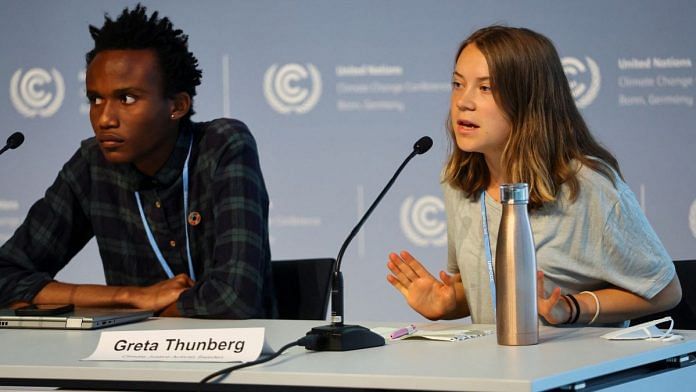Berlin: Swedish activist Greta Thunberg warned on Tuesday that humanity was “rushing towards the cliff” of climate catastrophe, and a new study by think tank Climate Analytics showed that could only be averted by ramping up wind and solar energy installations five times faster and cutting fossil fuels production 6% annually by 2030.
The study was released on the sidelines of the UN climate talks in Bonn, where Thunberg said humanity needed to act on the climate crisis now or face “the death sentence.”
“We’re still rushing towards the cliff and we are at the verge of potential tipping points that once we pass them, there might be no going back,” Thunberg said.
Renewable energy’s share in electricity generation has surged to about 30% globally due to falling cost. In order to limit global warming to 1.5 degrees Celsius (2.7 degrees Fahrenheit), that share needs to more than double to over 70% by 2030 for the world to keep global warming at 1.5 degrees Celsius above pre-industrial levels, the study said. It cited a scientific analysis of the United Nations Intergovernmental Panel on Climate Change’s (IPCC) March 2023 report.
If that level is crossed, it could unleash far more severe climate change effects, it said.
“Total wind and solar capacity should reach around 10 terrawatt (TW) by the end of the decade five times the 2 TW of capacity in 2022, the study found. It said reaching that target would require installing 1.5 TW of new wind and solar capacity per year by 2030, a five-fold increase from 2022 levels of 0.3 TW.
The study by Climate Analytics, a global climate science and policy institute started in 2008 and based in Berlin, said global fossil fuel use must drop by around 40% over the decade, with coal falling by 79%.
Discussions at UN climate talks in Germany have intensified over the issue of listing the phase-down or exit of fossil fuels on the agenda of COP28 climate summit in Dubai in December.
“As we ramp up renewables, we can’t forget the elephant in the negotiating room – fossil fuels,” Claire Fyson, one of the study’s authors said at a news conference.
Many in the fossil fuel industry have touted carbon capture and storage technologies as a possible solution, including COP28 President Sultan al-Jaber who is also chief executive of Abu Dhabi national oil company. But Fyson said these would play a minimal role at best in cutting greenhouse gas emissions.
“When looking specifically at the power sector, we find that carbon capture and storage would be used for a maximum 0.1% of global electricity production in 2030,” she said.
The Bonn conference is seen as mid-way test ahead of the COP28 meeting.
(Reporting by Riham Alkousaa; Editing by David Gregorio)
Disclaimer: This report is auto generated from the Reuters news service. ThePrint holds no responsibilty for its content.
Also Read: ‘Climate crisis is real’: International help rolls in for Canada to fight worst-ever wildfires



